Femia > Health Library > Getting Pregnant > Trying to conceive > 14 DPO: What to expect, and how to tell if you’re pregnant
14 DPO: What to expect, and how to tell if you’re pregnant
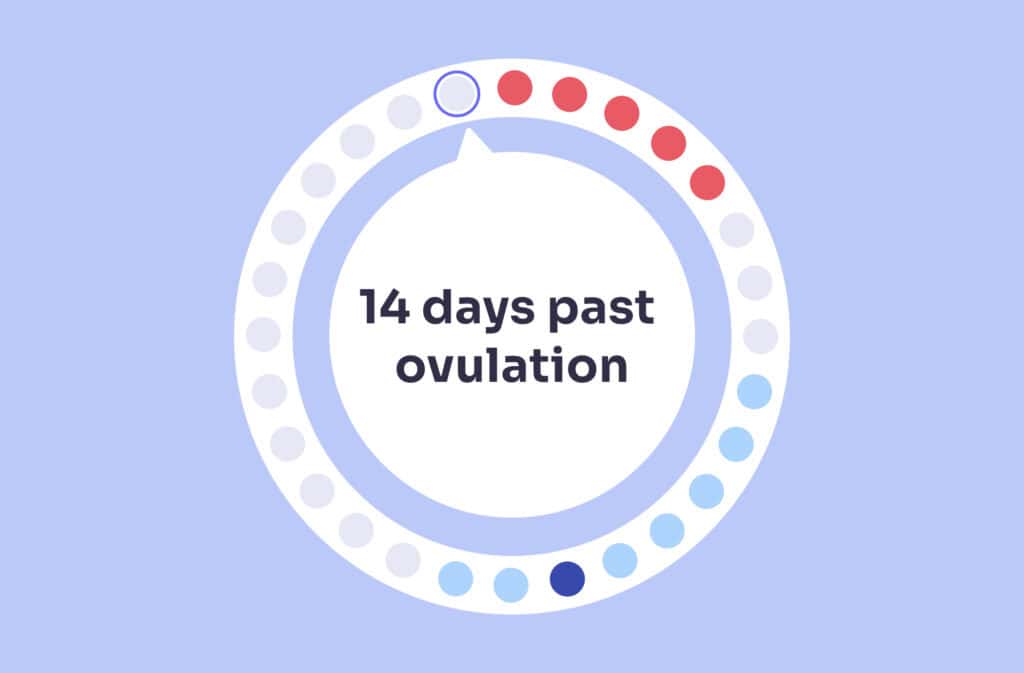
- Updated Feb 25, 2025
- Published
CRAFTED BY HUMAN
Crafted by human At Femia, we provide accurate and up-to-date information at every stage of your journey, from trying to conceive, pregnancy and postnatal support. All content is created by a real person based on in-depth research and own professional experience. Femia ensures that you will receive expert advice, strict accuracy and a personalized approach from our authors/medical experts. Learn more about our editorial policy.
FACT CHECKED
Fact checked At Femia Health, we maintain the highest standards of editorial excellence in delivering content focused on helping you conceive, guiding you through pregnancy, and supporting you postpartum. Explore our content review principles to learn how we ensure the accuracy and quality of our health and lifestyle tips for every stage of your journey.
At 14 DPO (14 days past ovulation):
- You’ve reached the end of your typical luteal phase.
- If pregnant, hCG levels are usually detectable by most pregnancy tests. Your period is due if you have a 28-day cycle.
- Early pregnancy symptoms may be more pronounced.
- 14 DPO symptoms can be quite similar to premenstrual symptoms, but may be more intense.
Welcome to 14 DPO! You’ve made it through the two-week wait, and now you’re at a significant milestone. Whether you’re hoping for a positive pregnancy test or anxiously awaiting your period, know that you’re not alone in this journey. Let’s explore what’s happening in your body and what signs you might be experiencing at this crucial time.
➡️ Read other Femia guides in this series:
- 1 DPO: What to expect, and how to tell if you’re pregnant
- 2 DPO: What to expect, and how to tell if you’re pregnant
- 3 DPO: What to expect, and how to tell if you’re pregnant
- 4 DPO: What to expect, and how to tell if you’re pregnant
- 5 DPO: What to expect, and how to tell if you’re pregnant
- 6 DPO: What to expect, and how to tell if you’re pregnant
- 7 DPO: What to expect, and how to tell if you’re pregnant
- 8 DPO: What to expect, and how to tell if you’re pregnant
- 9 DPO: What to expect, and how to tell if you’re pregnant
- 10 DPO: What to expect, and how to tell if you’re pregnant
- 11 DPO: What to expect, and how to tell if you’re pregnant
- 12 DPO: What to expect, and how to tell if you’re pregnant
- 13 DPO: What to expect, and how to tell if you’re pregnant
- 15 DPO: What to expect, and how to tell if you’re pregnant
- 16 DPO: What to expect, and how to tell if you’re pregnant
What does 14 DPO mean?
14 DPO stands for “14 days past ovulation.” This marks the end of your luteal phase and, for many women with a 28-day cycle, the expected first day of their period.
It’s a time filled with anticipation and possibly a mix of emotions. Remember, whatever you’re feeling is valid, and it’s okay to take a moment to acknowledge those feelings.
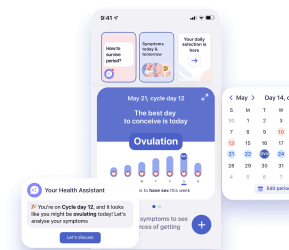
What's happening in your body at 14 DPO?
At 14 DPO, your body is at a crossroads. Here’s what might be going on:
1. Hormone changes
If you’re pregnant, your hCG levels are rising rapidly, supporting the early stages of pregnancy. If not, your estrogen and progesterone levels are dropping, signaling the start of your menstrual cycle.
2. Uterine activity
Your uterine lining is either preparing to support a growing embryo or beginning to shed if pregnancy hasn’t occurred.
3. Potential early pregnancy
If conception took place, the embryo is now firmly implanted and developing quickly.
14 DPO symptoms: What might you be experiencing?
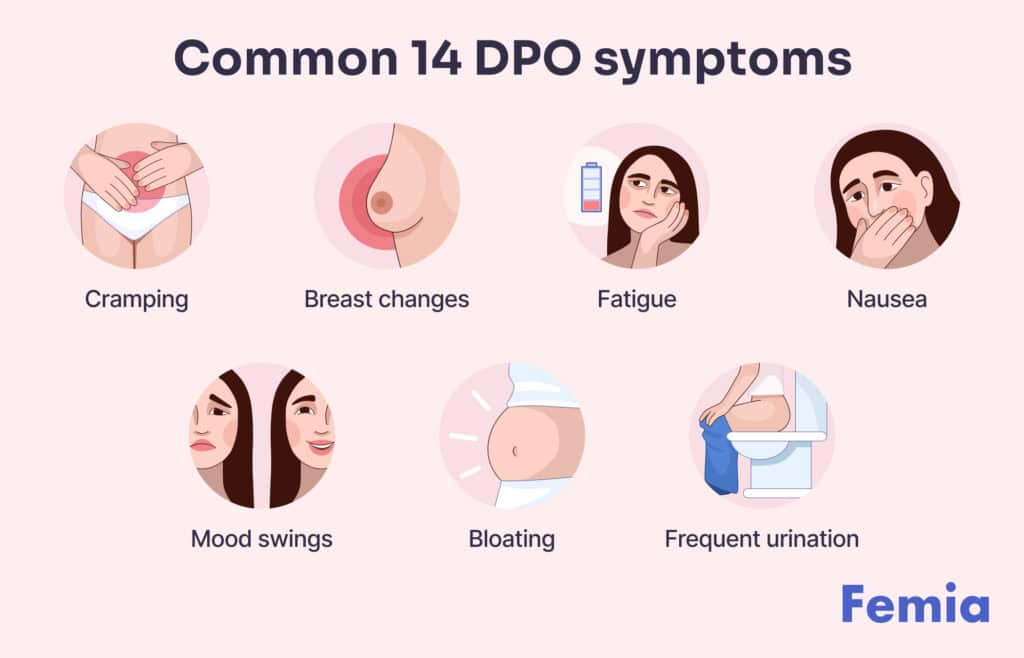
At 14 DPO, symptoms can be more noticeable. Here’s what you might be feeling:
- Cramping: You might experience mild cramping, whether you’re pregnant or about to start your period.
- Breast changes: Increased tenderness, swelling, or darkening of the areolas.
- Fatigue: Feeling more tired than usual is common in early pregnancy.
- Nausea: Some women may start experiencing morning sickness.
- Mood swings: Hormonal changes can lead to emotional fluctuations.
- Bloating: You might feel puffy or bloated in your abdomen.
- Frequent urination: You might find yourself visiting the bathroom more often.
Remember, everyone’s body is different, and you might experience all, some, or none of these symptoms. Trust your instincts and don’t hesitate to reach out to a healthcare provider if you have concerns.
14 DPO discharge if pregnant
At 14 DPO, pregnancy-related discharge often has these characteristics:
- Volume: Usually increased
- Consistency: Creamy or milky
- Color: Typically clear or white
- Odor: Mild or odorless
However, discharge can vary greatly among women and isn’t a definitive sign of pregnancy.
👉Find out more: Fertility diet: What to eat to boost your chances of getting pregnant
14 DPO: Cervical mucus
Cervical mucus at 14 DPO can provide clues about your body’s state:
- If pregnant: Often creamy, abundant, and white or yellow in color
- If not pregnant: May become thicker or decrease as your period begins
Remember, while these changes can be interesting to note, they’re not a reliable method to confirm or rule out pregnancy.
14 DPO: No period but cramping
If you’re 14 DPO with no period but experiencing cramping, it could mean a few things:
- Early pregnancy: Mild cramping can be a sign of early pregnancy as your uterus begins to change.
- Delayed period: Stress, lifestyle changes, or hormonal fluctuations can delay your period.
- Late implantation: Although less common, implantation can occur later for some women.
If you’re trying to conceive, this can be an emotionally charged time. Be gentle with yourself and consider taking a pregnancy test if your period doesn’t arrive in the next day or two.
Is 14 DPO too late for implantation bleeding?
While 14 DPO is generally considered late for implantation bleeding, it’s not impossible. Implantation typically occurs between 6-12 days after ovulation, but everyone’s body is different. If you’re experiencing light spotting at 14 DPO, it could be:
- Late implantation bleeding
- Early signs of your period
- Pregnancy-related spotting
14 DPO implantation bleeding or period
Distinguishing between implantation bleeding and the start of your period can be tricky. Here’s a comparison:
| Characteristic | Implantation bleeding | Period |
|---|---|---|
| Color | Light pink or brown | Bright to dark red |
| Flow | Light, spotty | Starts light, becomes heavier |
| Duration | Usually 1-2 days | 3-7 days |
| Cramping | Mild, if any | Can be more intense |
If you’re unsure, a pregnancy test at this stage can often provide clarity.
14 DPO hCG levels
At 14 DPO, hCG levels in pregnant women typically range from 10-426 mIU/mL.
However, these numbers can vary widely between individuals. What’s most important is how your hCG levels change over time, not a single measurement.
👉Find out more: Evaporation line vs. faint positive: How to tell the difference on your pregnancy test
14 DPO: How many weeks pregnant?
If you’re pregnant at 14 DPO, you’re considered to be about 4 weeks pregnant. This might seem confusing, but pregnancy is typically counted from the first day of your last menstrual period, not from conception.

Questions from the Femia community
I'm 14 DPO and my breasts are extremely sore. Is this a sure sign of pregnancy?
While breast soreness can be a pregnancy symptom, it can also occur before your period. The key difference is often in the intensity and duration. If you're pregnant, the soreness might persist and even increase. A pregnancy test at this stage should give you a reliable answer.
My 14 DPO pregnancy test was negative, but I still haven't gotten my period. What should I do?
It's possible that you ovulated later than you thought, or that your cycle is longer this month. Wait a few days and test again if your period doesn't start. If you continue to have negative tests but no period, it's a good idea to consult with your healthcare provider.
I'm experiencing some light spotting at 14 DPO. Could this be implantation bleeding?
While 14 DPO is on the late side for implantation bleeding, it's not impossible. However, it could also be the start of your period or even early pregnancy spotting. If the spotting remains light and you don't get your full period in the next day or two, consider taking a pregnancy test.
The bottom line
At 14 DPO, you’re at a significant point in your cycle. Whether you’re hoping for pregnancy or not, it’s normal to feel a mix of emotions. Remember, your body is amazing regardless of the outcome, and you’re doing great navigating this journey.
If you’re trying to conceive and get a negative test or your period arrives, it’s okay to feel disappointed. Be kind to yourself and remember that each cycle is a new opportunity. If you get a positive test, congratulations! Consider scheduling an appointment with your healthcare provider to confirm the pregnancy and start your prenatal care.
No matter where you are in your journey, remember that you’re not alone. There’s a whole community of women going through similar experiences. Don’t hesitate to reach out for support, whether it’s to friends, family, or healthcare professionals. You’ve got this!
➡️ Read other Femia guides in this series:
- 1 DPO: What to expect, and how to tell if you’re pregnant
- 2 DPO: What to expect, and how to tell if you’re pregnant
- 3 DPO: What to expect, and how to tell if you’re pregnant
- 4 DPO: What to expect, and how to tell if you’re pregnant
- 5 DPO: What to expect, and how to tell if you’re pregnant
- 6 DPO: What to expect, and how to tell if you’re pregnant
- 7 DPO: What to expect, and how to tell if you’re pregnant
- 8 DPO: What to expect, and how to tell if you’re pregnant
- 9 DPO: What to expect, and how to tell if you’re pregnant
- 10 DPO: What to expect, and how to tell if you’re pregnant
- 11 DPO: What to expect, and how to tell if you’re pregnant
- 12 DPO: What to expect, and how to tell if you’re pregnant
- 13 DPO: What to expect, and how to tell if you’re pregnant
- 15 DPO: What to expect, and how to tell if you’re pregnant
- 16 DPO: What to expect, and how to tell if you’re pregnant
References
- American College of Obstetricians and Gynecologists (ACOG). “Early Pregnancy Loss: Miscarriage and Molar Pregnancy.” ACOG Practice Bulletin, no. 200, 2018, pp. 1-10. The American College of Obstetricians and Gynecologists. https://www.acog.org/clinical/clinical-guidance/practice-bulletin/articles/2018/11/early-pregnancy-loss.
- “Luteal Phase, an overview.” ScienceSirect. https://www.sciencedirect.com/topics/medicine-and-dentistry/luteal-phase.
- American College of Obstetricians and Gynecologists. “Fertility Awareness-Based Methods of Family Planning.” ACOG Practice Bulletin No. 205, 2019. https://www.acog.org/womens-health/faqs/fertility-awareness-based-methods-of-family-planning.
- National Institutes of Health. “What are some common signs of pregnancy?” National Institute of Child Health and Human Development, 2017. https://www.nichd.nih.gov/health/topics/pregnancy/conditioninfo/signs.
- Mayo Clinic Staff. “Home pregnancy tests: Can you trust the results?” Mayo Clinic, 2022. https://www.mayoclinic.org/healthy-lifestyle/getting-pregnant/in-depth/home-pregnancy-tests/art-20047940.
- U.S. Food and Drug Administration. “Pregnancy.” FDA, 2019. https://www.fda.gov/medical-devices/home-use-tests/pregnancy.
- Johnson, Sarah R., et al. “Levels of Urinary Human Chorionic Gonadotrophin (hCG) Following Conception and Variability of Menstrual Cycle Length in a Cohort of Women Attempting to Conceive.” Current Medical Research and Opinion, vol. 25, no. 3, 2009, pp. 741-748. https://pubmed.ncbi.nlm.nih.gov/19196217/.

Learn how ovulation affects your emotions and triggers mood swings. Discover the causes, common symptoms, and treatment methods to manage your mood swings effectively.
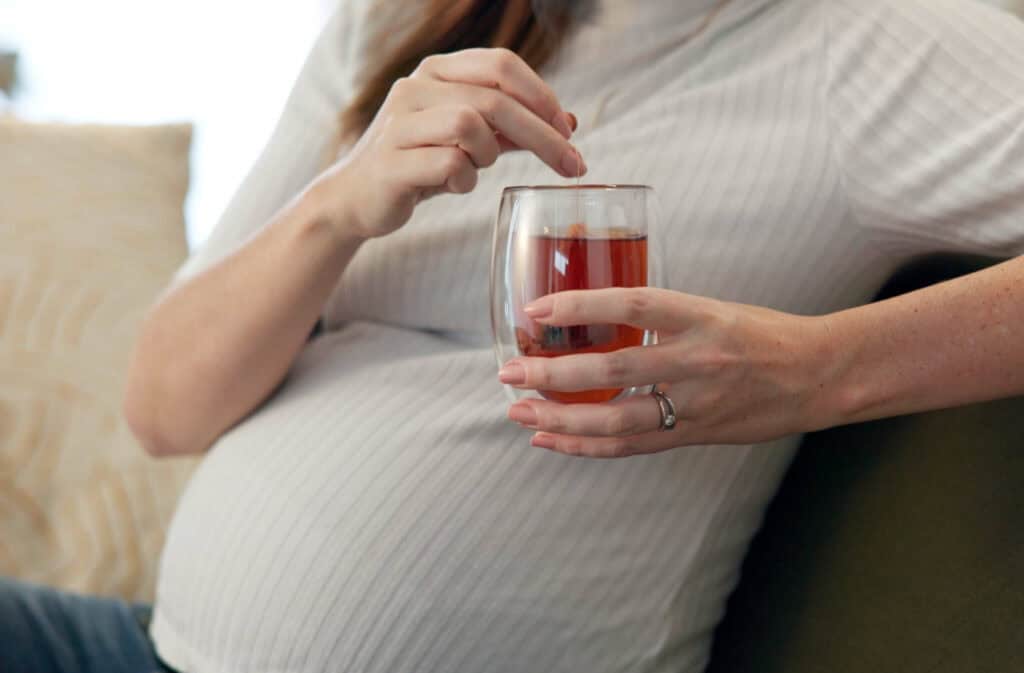
Can you drink tea while pregnant and which ones are safe? Click to find a detailed guide to tea consumption in pregnancy and make healthy choices!
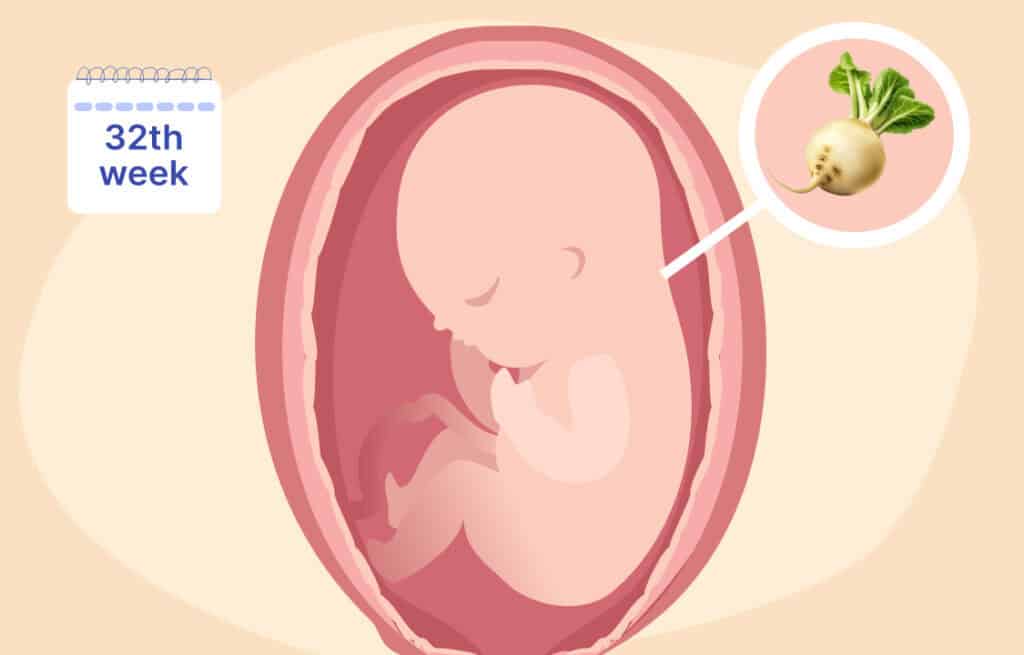
At 32 weeks pregnant, your baby is growing and nearing full-term readiness. Explore symptoms, labor prep, and preemie survival rates.

